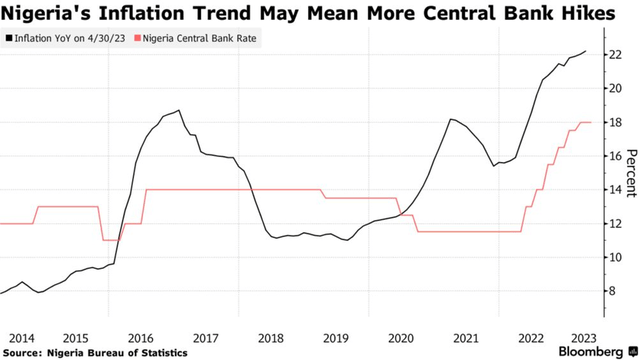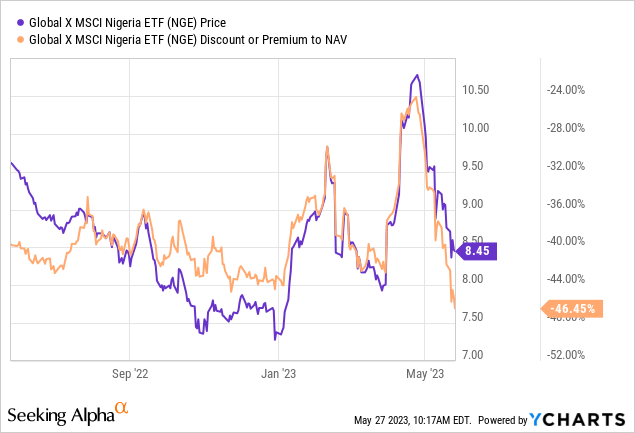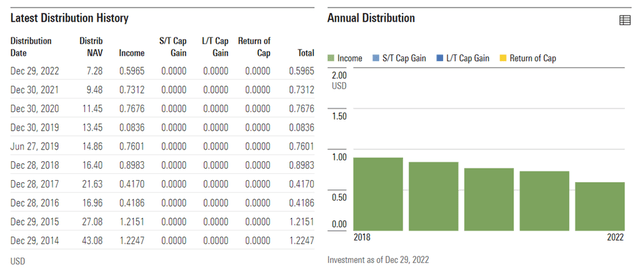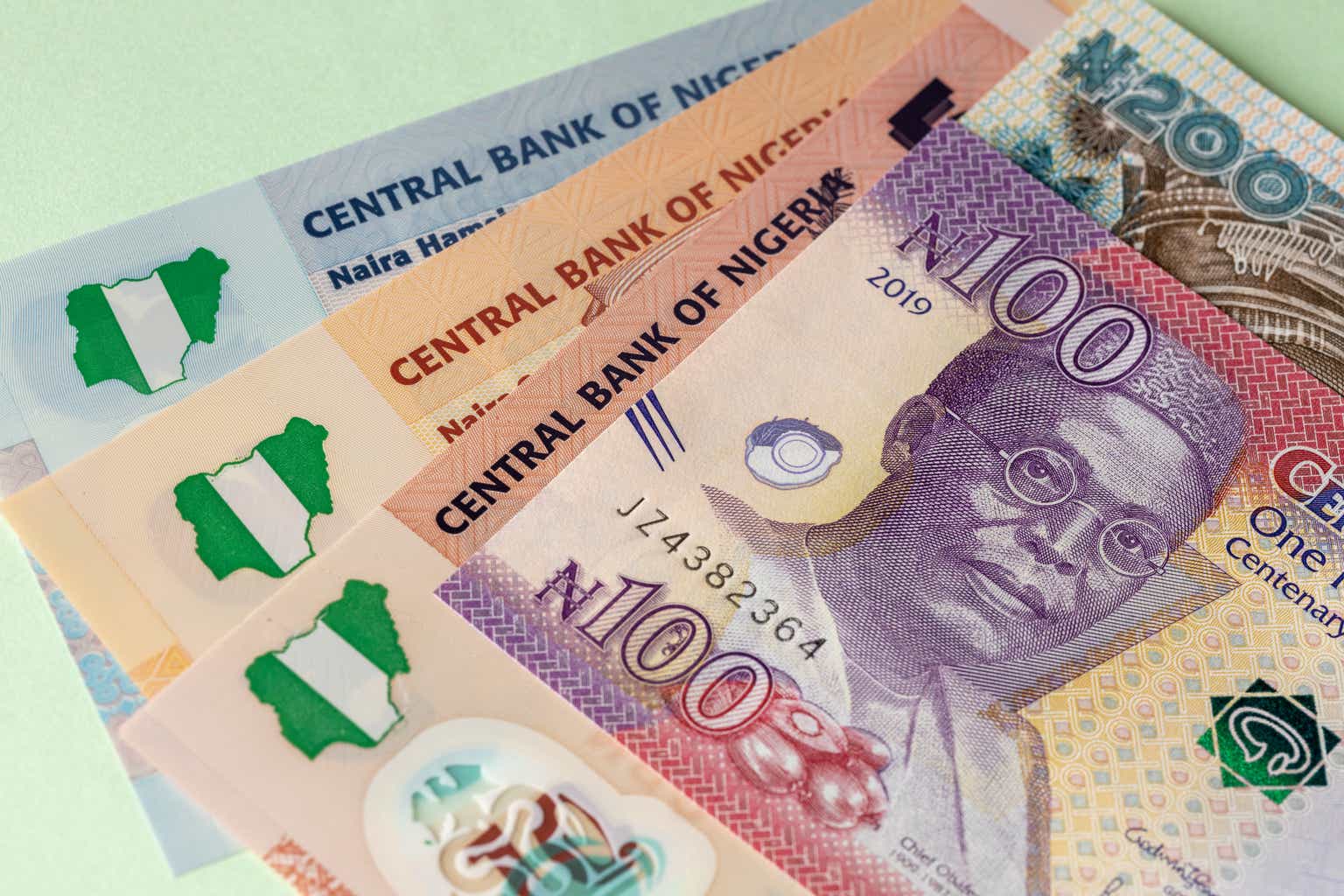With the election done and dusted, Nigeria looks set for some big reforms once its new President, Bola Tinubu, is sworn in next week. The incoming government campaigned on a controversial (but fiscally prudent) economic platform to remove fuel subsidies and deliver on necessary currency adjustments to address the ongoing economic challenges. But whether the election promises will ultimately be delivered is another question entirely. The Nigerian economy is already feeling the brunt of rate hikes, with GDP growth down to ~2% and inflation accelerating to >22% this month. The Central Bank of Nigeria (the CBN) isn’t done with tightening either – the latest 50bps hike has taken the country’s benchmark rate to a new high at 18.5%, but rates are still well below inflation.
Bloomberg
For investors, the threat of a slowing economy is outweighed by the risks associated with a heavily managed FX policy that has yielded sharp bouts of devaluation in recent years. The ongoing naira shortage, a result of the central bank’s abrupt decision to retire old Naira notes (subject to a deadline) in exchange for redesigned Naira notes, has only compounded the FX risks for investors.
On the flip side, there is also reward – the Global X MSCI Nigeria ETF (NYSEARCA:NGE) now trades at a record NAV discount (~46%), a result of the worsening naira shortage in recent months. But FX shortages (on both sides) have been a persistent issue through the years, along with capital controls, so there is no guarantee that the FX headwinds will reverse anytime soon. Ahead of a potentially significant FX adjustment in H2, when the new government gets going, as well as the underlying economic headwinds in Nigeria, investors risk even more pain in the coming months. For now, NGE goes into my ‘too hard’ pile.

Fund Overview – Low-Cost Portfolio to Track the Nigerian Economy
The US-listed Global X MSCI Nigeria ETF seeks to track, before expenses, the yield and price performance of the MSCI All Nigeria Select 25/50 Index, comprising a select group of at least 20 constituents of the Nigerian equity universe (subject to a liquidity threshold of $100k of average daily traded value). The ETF held ~$47m of net assets at the time of writing and charged a 0.8% expense ratio, making it a cost-effective option for US investors looking to access Nigerian equities. A summary of key facts about the ETF is listed in the graphic below:
Global X
The fund is spread across 20 holdings, with Financials making up the largest sector allocation at 48.1%, followed by Consumer Staples at 20.5% and Materials at 19.2%. On a cumulative basis, the top five sectors accounted for 100% of the total portfolio, making NGE a highly concentrated ETF from a sector standpoint. In line with the fund’s focus on defensive sectors (Financials and Consumer Staples contribute ~68% of the portfolio), the equity beta is low at 0.22 to the S&P 500 (SPY) and 0.35 to MSCI EAFE (EFA), a proxy for developed markets ex-North America. The fund isn’t very correlated to global emerging market indices either, with a beta of 0.52 to the MSCI Emerging Markets (EEM).
Global X
The single-stock allocation of NGE reflects its financials-focused sector allocation, with three of the fund’s top-five holdings in the commercial banking space (Zenith Bank, Guaranty Trust, and FBN Holdings). The largest holding remains multinational cement manufacturer Dangote Cement at 13.1%, while the second-largest holding is the Nigerian Naira at 9.1% of net assets. Other key holdings include food & beverage player Nestle Nigeria (6.1%) and hospitality, agribusiness, and energy conglomerate Transnational Corporation of Nigeria (5.9%), as well as leading telco MTN Nigeria (5.2%). In total, the five largest holdings contribute ~44% of the 20-stock portfolio, making NGE a relatively concentrated ETF from a single-stock perspective as well.
Global X
Reflecting the various risks associated with investing in a frontier market like Nigeria (political instability, corruption, etc.) and the concerning Naira shortages in recent months, the underlying portfolio trades well below book value at ~0.5x. In contrast, the portfolio offers an ~18% return on equity (ROE), though Nigeria’s 18.5% lending rate implies limited shareholder value creation (i.e., ROE below the cost of equity).
Global X
Fund Performance – Underwhelming Through the Cycles
On a YTD basis, the ETF has appreciated by ~15% but has declined at an annualized -13.6% (-10.3% rate in NAV terms) since its inception in 2013. Digging deeper, the fund has only delivered a positive return in one calendar year since it was launched – a reflection of the many structural problems (financial and political) that have plagued the Nigerian economy over the last decade. As a result, NGE remains a long way off its high in 2013, declining a cumulative -76.9% (-66.4% in NAV terms) and trailing the MSCI Frontier Markets index by a big margin. With the ETF annualizing at a dismal -12.5% over the last five years (vs. the MSCI Frontier Markets at -2.1% and the MSCI All Country World Index at +7.0%), investors haven’t been adequately compensated for the risks associated with Nigerian equities.
Global X
The semi-annual distribution, derived entirely from income, is high, though you’d expect that for a fund concentrated in market-leading banking and consumer staple stocks. The 2022 payout amounted to $0.60/share, which implies a strong ~7% yield. The payout in absolute terms has declined in line with the NAV trend, though, so income investors should look elsewhere. And with the one-two punch of steep rate hikes and severe Naira shortages this year likely to hit commercial banking operations hard, the fund’s distribution could disappoint this year.
Morningstar
Conclusion
In a world where ETFs rarely stray far from their underlying net asset values, the NGE ETF’s ~46% NAV discount stands out. Closing this discount has historically been a challenge because Nigeria has long suffered FX shortages on both sides (dollars and naira). Yet, the central bank continues to maintain a heavily controlled exchange rate policy, driving steep bouts of depreciation/devaluation through the years. The CBN’s latest move to retire old naira notes (initially by a January deadline but since extended), ostensibly to exert greater control over the money supply, has only exacerbated the FX shortage issue. No wonder then that the NGE discount to NAV has steepened by 20-30%pts this year.
But even a 50% discount may not be enough to skew the risk/reward in the right direction. Nigerian markets are poised for turbulence ahead as a new President takes over next week, having won the election on a fiscal consolidation platform. In practice, however, removing fuel subsidies and balancing the budget will be a challenge. With the economy already strained by inflation-fighting hikes, the cash transfers needed to offset the impact could entail more debt and significant FX adjustments in the coming months. Pending better post-election policy clarity, I would steer clear of Nigerian equities.
Read the full article here




